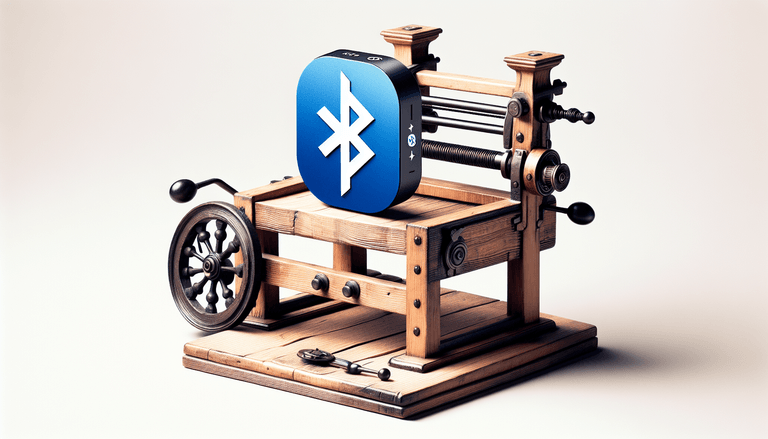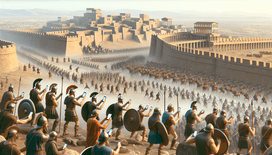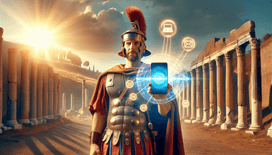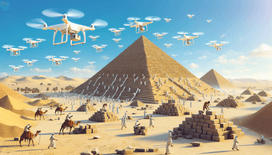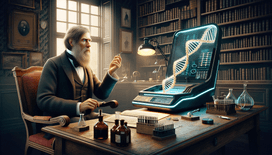Ah, the 15th century! A time of brooding art, transformative knowledge, and, rather than texting, painting extravagant manuscripts with quills. It was the era when if you wanted to say "Hello!", you'd probably take a fortnight to craft a parchment scroll and another to find someone literate enough to read it. Yet, among the illuminated letters and ink splatters, one particular gentleman was furiously chiselling away at history: Johannes Gutenberg.
Consider for a moment, our friend Johannes not in the dimly lit workshops of Mainz but in a hypothetical alternate reality. A reality where a device as little and unassuming as a Bluetooth dongle found its way into his capable, ink-stained hands. Can you imagine Gutenberg synchronizing his press with a Bluetooth-enabled cartridge, turning his cumbersome machine into a wireless wonder and perhaps giving poor Elon Musk a run for his money?
The Dawn of Bluetooth-Enhanced Publishing
Now, picture Gutenberg, donned in his tunic, staring at this mysterious, glowing device, pondering its alchemical properties. It's really nothing new; Bluetooth’s magically seamless communication would have suited his spirits entirely. He’d have been delighted to learn it ensures that communications flow like a serene Rhine River.
Our historical hero might have used Bluetooth to send instructions from a scribe's ancient laptop across the room to the clunky wooden press, sparing his apprentices the burden of manually adjusting each metal character. What a revolution! Gone would be the days of laborious typesetting; in their stead, pages would pour out like a constant stream of Renaissance enlightenment.
Kickstarting the Renaissance: Viral Edition
Of course, with such blazing speed and efficiency, Gutenberg might have kickstarted the Renaissance a couple of decades early through sheer force of viral sensation. Imagine waking up, sipping on a skinny mocha, and discovering that every notable philosopher's treatise had become the Elizabethan equivalent of a viral meme.
Philosophers from across the continent would eagerly send him their philosophical tweets, mini-essays on scrolls of all kinds. "Cogito ergo sum!" would have ricocheted across Europe, causing existential dread faster than you can say "Des-cart!" Knowledge and mediocre poetry passed around faster than a monk's ale mug at Oktoberfest.
The Bromance Surge in Information
Such blazing efficiency in print would ignite an information bromance. How fond Johannes would have been of Erasmus, publishing philosophical discourses for widespread sharing to eager students throughout Europe!
Envision those crowded café corners and academic abbeys vibrating with anticipation as students excitedly sync their leather-bound journals via Gutenberg tech, whispering conspiratorially with inklings of a printing-era Blockchain.
Benches and Benches of Printed Bliss
Bookshelves would have shed their scrolls to furnish benches close to heart, each spine representing a leap into the abyss of the ancient Facebook wall. Lecterns would buckle under the weight of such soul-searching inquiries as "To be, or not to be?" in Bluetooth enabled print, certainly a solid justification for a philosophical existential crisis.
Perhaps Bluetooth could have coaxed other inventions into existence. Get ready for the great "Audiobooks-on-Wagon" revelation from Gutenberg’s cart. One can only hope, as this future history would eliminate many a cumbersome carriage ride by offering bestsellers and classic epics recounted from the comfort of cart seats.
Securing a Legacy with a Secure Connection
Gutenberg, armed with his Bluetooth advantage, would have practically gnawed at history like a particularly hungry scholar at a college feast. His press's influence would have spread like wild parchment across the Europe of yore, fostered by the wireless whimsy of Bluetooth.
So next time you connect your earbuds or effortlessly share a song via Bluetooth, imagine, if you will, the man who started it all, not with frequent flier miles but with the unbeatable dream of connection, of printing it forward.
In this version of retro-futuristic history, the modern world owes its data exchange, its capacity for clarity, and the tweeted thoughts of yesteryear to none other than the dream-fueled finesse of Gutenberg and his Bluetooth-enabled press.
